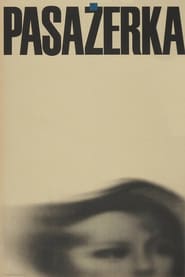
Polish Director Andrezej Munk was only able to complete three films before his tragic death in a car accident in 1963. When he died he was in the middle of filming a fourth film surrounding the holocaust. That film is, “Passenger”, and it is a great shame that he was unable to complete it because what he did succeed in filming is a harrowing visual representation of the horrors of the Nazi Death camps. Polish director Witold Lesiewicz took the completed original footage, and still photographs from the production to give a semi completed story and released the film based on screenplay sketches that Munk had left before he died. There was never a completed screenplay in existence so a lot of their work was based hypothesis. Lesiewicz actually narrates in the film, explanations as to the methods he used to finish it. The narration at the beginning of this version had me thinking I was about to watch a documentary. The movie that was released is only 62 minutes long, and I assume that a lot was left unsaid. It relates the story of a Lisa (Aleksandra Slaska), who was a female SS officer in the death camp Auschwitz, during the war. She is returning to Germany after many years with her newlywed husband, on a luxury liner cruise ship. There she sees a woman from her dark past. This is Marta (Anna Ciepielewska in a chilling performance that reminded me of Rene Falconetti’s portrayal of Joan of Arc from 1928), who was a political prisoner in Auschwitz at the same time that Lisa was there. This is all recounted through still photographs and voiceovers. Lisa recounts two different interpretations of her experiences with Marta. The first recollection is to her husband, which gives her kind human motives to her actions and then when she is alone we see flashbacks as she recalls what actually occurred. The flashbacks in Auschwitz are the actual finished footage that Munk was able to complete. The scenes in the death camp are riveting and stark, making use of some unflinching images of cold hard cruelty that existed in the backdrop of a Nazi Death camp. This is a Polish film, directed by a Pole making it that much more relevant. Scenes were shot on location in Auschwitz itself, making them even more terrifying. .It was interesting to me that in order to pacify the Polish public that the prisoners shown in the main plot of the story were Polish political prisoners who’s fate was better than that of the Jews. Munk to his credit still made sure he showed us very clear hints as to the Jewish elements of the camp. Lisa as an SS officer is in charge of confiscating the possessions of the doomed and she shifts through a lot of clothing that still had the Jewish star sewed on. There are constant sudden jumps to views of the smokestacks that came from the furnaces which burned the bodies and we are even privy to an SS soldier repairing some sort of chemical capsule on the roof over the so called showers that were used as gas chambers. The story involving Lisa the SS guard and Marta, the prisoner from whom she is infatuated with has Lesbian love undertones that emphasizes cruel self interest in actions of the people assigned the most evil of jobs. Munk is telling us that if these people tell you that they had no choice in their actions, don’t believe them. The Zombie like faces of the prisoners gives off a feeling of terror beyond hope. I would have loved to have seen a completed film as it is clear to me that Munk had something to say about Poland’s culpability in the Holocaust and the horrors of hate within western society. What actually remains is an hour’s worth of riveting cinema

